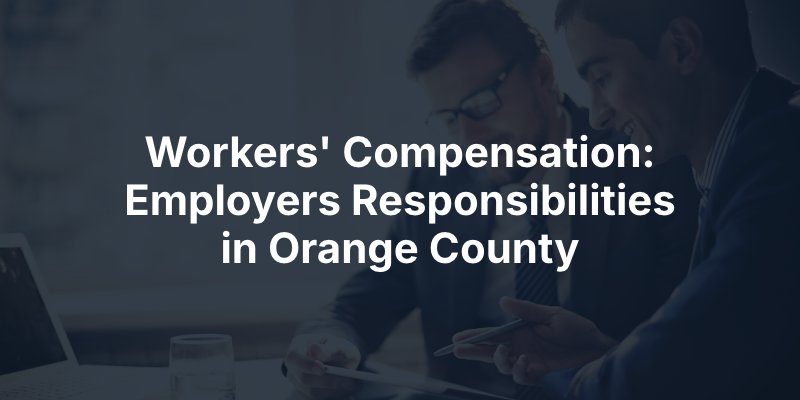Workers’ compensation is a no-fault insurance system that provides benefits to employees injured on the job or who develop work-related illnesses. In exchange for these benefits, employees typically forgo the right to sue their employer for workplace injuries. California law requires all employers to carry workers’ compensation insurance, even if they have only one employee.
If you or a loved one have been injured in the workplace, contact our Orange County workers’ compensation attorneys to discuss your legal options today.

All employers in Orange County must secure workers’ compensation insurance through an authorized provider or qualify for self-insurance. Failure to carry insurance can result in fines, penalties, and potential criminal charges. Additional responsibilities include:
Employers must display a Notice to Employees—Injuries Caused by Work in a visible area, outlining employee rights and employer obligations under workers’ compensation laws.
When an employee reports a workplace injury or illness, the employer must provide a DWC 1 Claim Form within one working day of receiving the report. This form initiates the workers’ compensation claim process.
Employers must report injuries or illnesses requiring more than first aid to their insurance carrier and the Division of Workers’ Compensation (DWC) within five days of learning about the incident.
Serious injuries, fatalities, or multiple injuries from workplace accidents must also be reported to Cal/OSHA within eight hours.
Employers are responsible for ensuring injured employees receive immediate and appropriate medical treatment. They must provide information about pre-approved medical providers and facilitate access to care.
Employers are prohibited from retaliating against employees who file workers’ compensation claims. Retaliation includes termination, demotion, reduction in hours, or other punitive actions.
Employers must keep detailed records of workplace injuries, claims filed, and communications with employees and insurance providers. Accurate records are essential for compliance and audits.
Employers have a duty to assist employees throughout the workers’ compensation process, including:
Submitting the completed claim form to the insurance carrier without delay to ensure timely processing and benefits.
Providing employees with updates about the status of their claims, benefits eligibility, and next steps.
Supporting employees in their transition back to work through modified duties or accommodations as recommended by medical providers.
Employers who fail to meet their responsibilities under California workers’ compensation laws may face serious consequences, including:
While employers have responsibilities, employees in Orange County have rights, including:
By meeting their responsibilities, employers help ensure these rights are upheld, fostering a safer and more supportive workplace.